Key takeaways:
- Understanding the urgency of climate action can drive personal change and inspire small, impactful habits.
- Identifying and reflecting on bad habits is crucial for aligning daily choices with sustainability goals.
- Progress tracking and community support enhance commitment and motivation in adopting eco-friendly practices.
- Sharing personal experiences can inspire and encourage others to make their own positive changes toward sustainability.
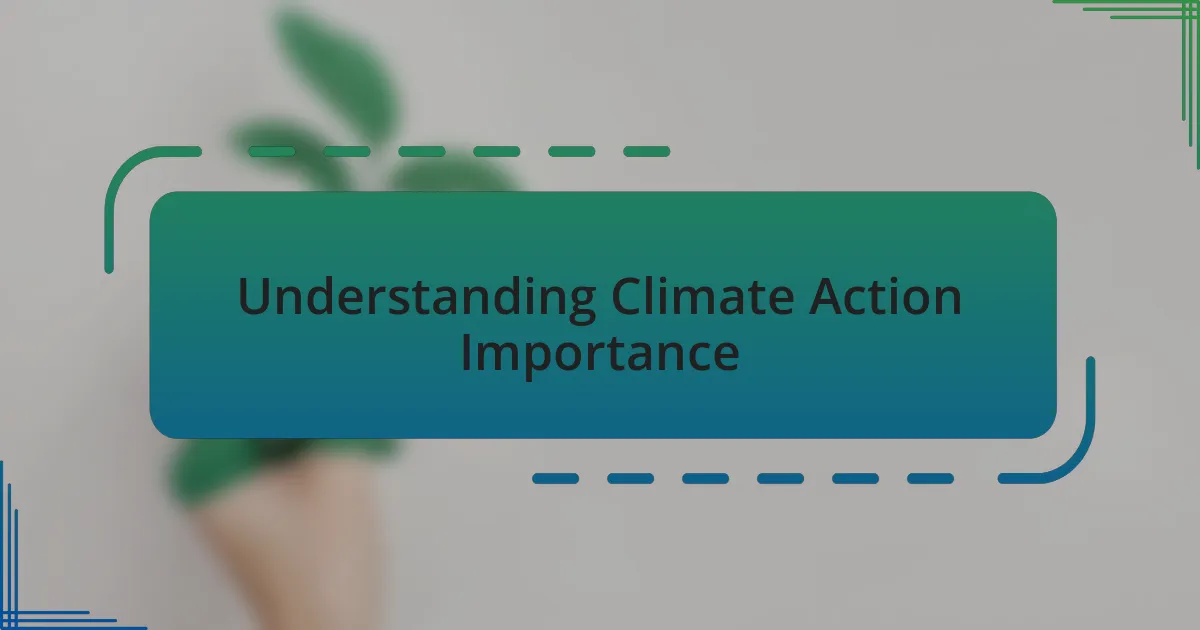
Understanding Climate Action Importance
Understanding the importance of climate action can be a deeply personal experience. I remember when I first learned about the drastic effects of global warming; seeing images of melting glaciers struck a chord in me. It made me wonder, what legacy are we leaving for future generations if we don’t take action now?
The urgency of this issue is impossible to ignore. When I shifted my perspective to view climate change as an existential threat, it propelled me into action. I started to ask myself—what can I do to make a difference, no matter how small? Those questions led me to examine my daily habits closely.
In my own journey, I’ve realized that every individual effort does contribute to a larger movement. Whether it’s reducing plastic use or opting for public transport, these actions accumulate to impact our planet positively. It’s not just about saving the Earth; it’s about nurturing our connection to it and to each other. How can we ignore our responsibility to protect that which sustains us?
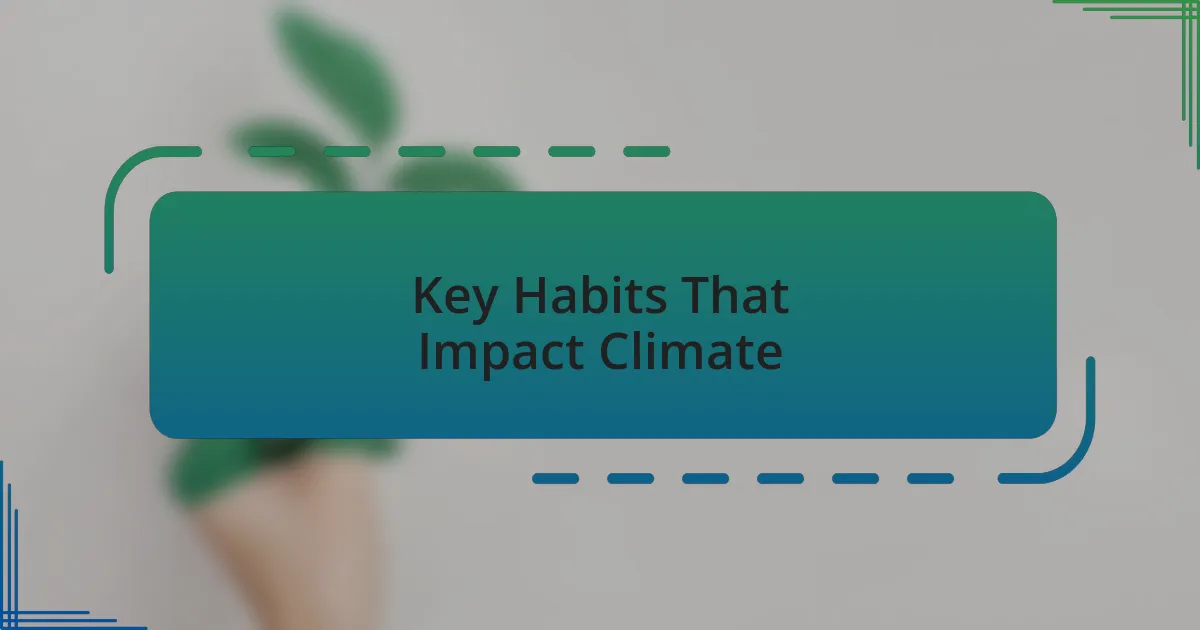
Key Habits That Impact Climate
One of the habits I adopted that profoundly affects climate change is reducing my meat consumption. I can recall the first time I decided to skip meat for a week. Initially, it felt daunting, but as the days passed, I discovered a variety of delicious plant-based meals. This change not only lightened my carbon footprint but also introduced me to new flavors and cooking techniques. Have you considered how much the livestock industry contributes to greenhouse gas emissions? I certainly hadn’t until I started exploring this option.
Another impactful habit is becoming more mindful of my energy consumption at home. I remember one evening after a long day, I instinctively reached for the light switch as the sun set. Then it struck me—why not embrace the natural light for as long as possible? Making tiny shifts, like using energy-efficient bulbs or turning off lights in unoccupied rooms, became second nature. Every kilowatt hour saved feels like a small victory, reaffirming my commitment to a sustainable lifestyle. Doesn’t it feel rewarding to take even the smallest steps towards more responsible energy use?
I’ve also made it a point to cut down on single-use plastics in my daily routine. When I made the switch to reusable bags, I felt a sense of pride with each grocery trip; it’s a habit I never imagined would become so integral to my life. How often do we pause to reflect on the sheer volume of plastic waste we generate? This change not only has a direct impact on reducing landfill waste but also serves as a conversation starter with friends and family. Engaging in this dialogue can inspire others to rethink their own consumption habits.
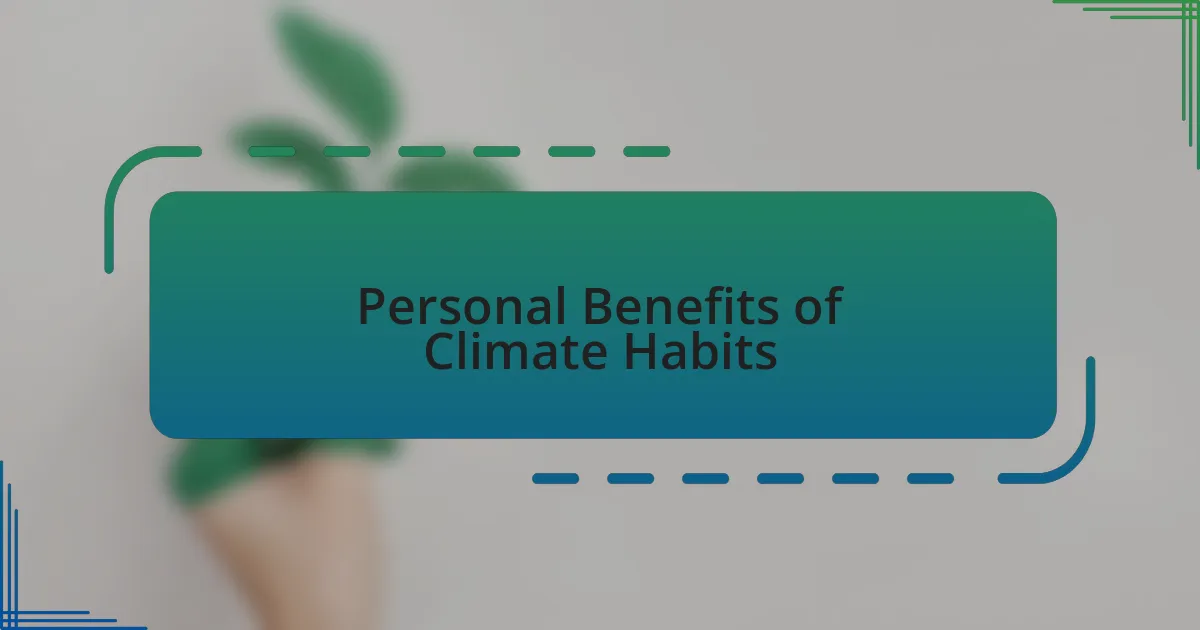
Personal Benefits of Climate Habits
When I first switched to biking instead of driving for short errands, I felt an unexpected rush of freedom alongside the environmental benefits. The fresh air and exercise lifted my mood, making routine tasks feel more enjoyable and less of a chore. Have you ever considered how exercise can boost your mental well-being while also reducing your reliance on fossil fuels? It’s a win-win that shifted my perspective on transportation.
Incorporating more local produce into my diet was another eye-opening habit. I remember shopping at a local farmer’s market for the first time; the vibrant colors and fresh aromas were invigorating. Beyond supporting the local economy and reducing food miles, I discovered that these seasonal ingredients brought out the best flavors in cooking. How often do we overlook the connection between our food choices and our community’s health? This habit not only nourishes my body but strengthens my bond with the local environment.
Lastly, I consciously decided to prioritize sustainable fashion. Initially, it felt overwhelming to shift away from fast fashion, but diving into thrifting became a thrilling adventure. Each unique piece tells a story, and I take pride in knowing I’ve made a choice that lessens the environmental impact of clothing production. Have you noticed the satisfaction that comes with choosing quality over quantity? I find that each thoughtful purchase brings not just joy, but a deeper appreciation for mindful consumerism.
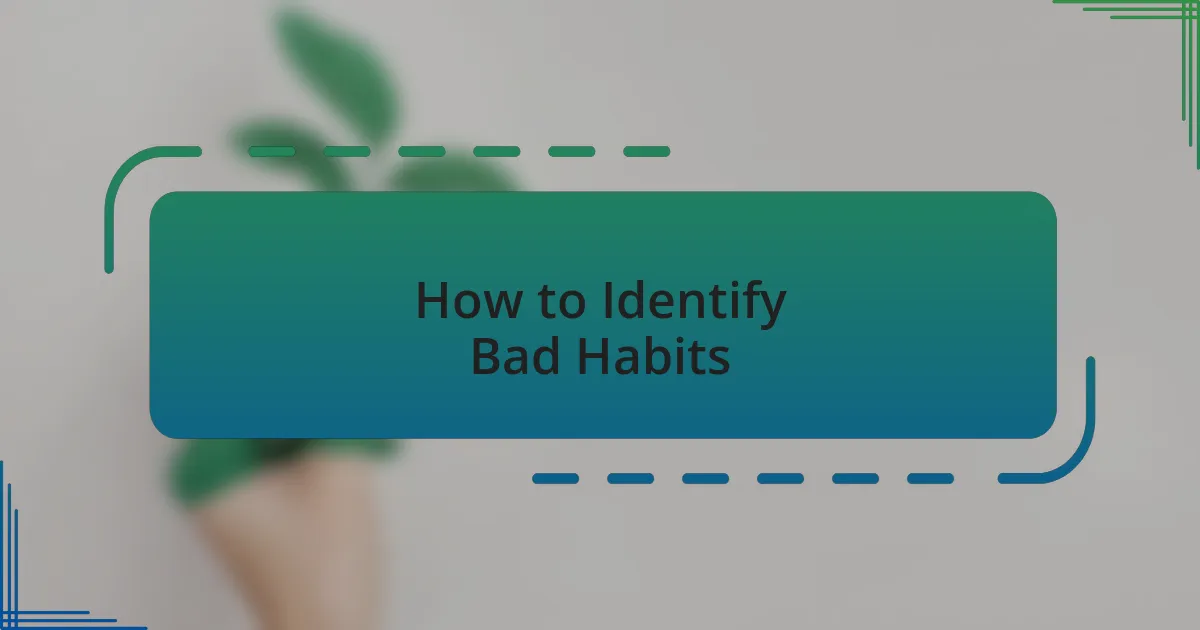
How to Identify Bad Habits
Identifying bad habits starts with self-awareness. I remember when I noticed my tendency to procrastinate on recycling because it felt like an inconvenience. By keeping a journal to track my daily activities, I realized how often I bypassed simple eco-friendly choices in favor of convenience. How often do we overlook the small steps that add up to bigger impacts?
I often find that bad habits can masquerade as routines. For instance, I used to grab coffee from a local shop every morning without thinking twice. It wasn’t until a friend pointed out the waste generated from those disposable cups that I realized I was fueling a habit that contradicted my climate goals. Have you ever paused to consider how your everyday choices align with your values?
To dig deeper, I recommend reflecting on how specific habits make you feel. Personally, after switching to reusable bags, I felt a sense of pride and responsibility. Instead of contributing to plastic pollution, I was actively making a choice I could stand behind. What emotions do your habits evoke? Recognizing the feelings tied to our actions can illuminate what may need to change.
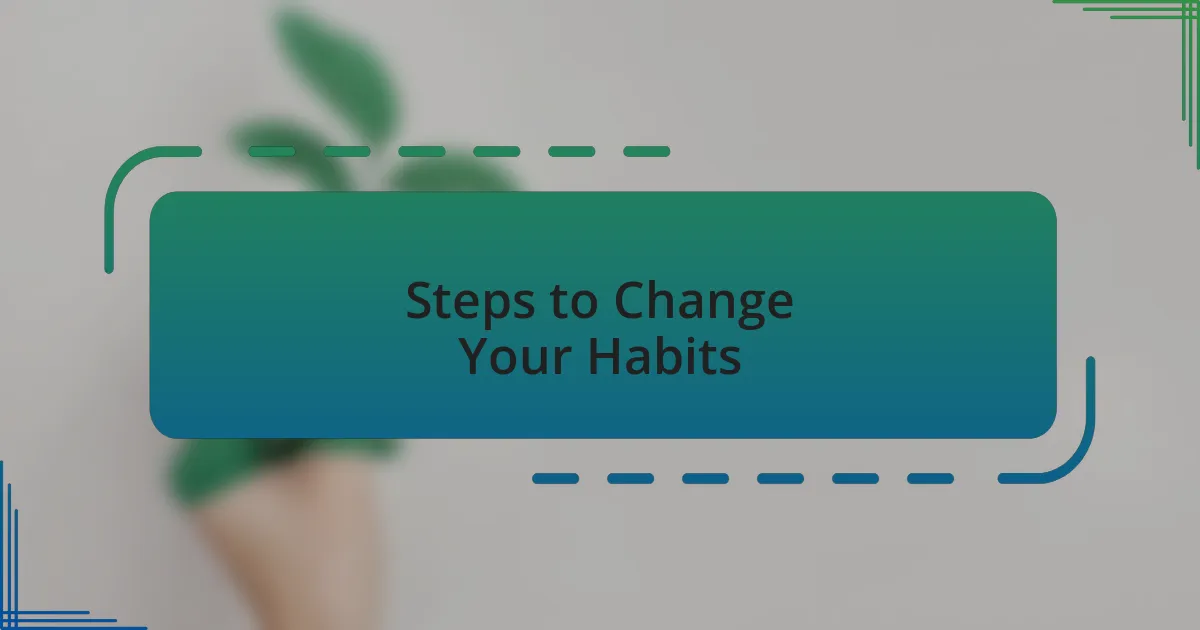
Steps to Change Your Habits
Changing habits can feel overwhelming, but breaking it down into manageable steps makes a difference. I found that starting with one small tweak in my routine can yield significant results. For instance, I replaced my plastic water bottles with a reusable one. It wasn’t just about the switch; it transformed how I approached hydration. Have you ever noticed how a simple change can create a ripple effect in your daily life?
Tracking your progress can also add a layer of accountability. I used a simple app to remind myself of my new commitment to reduce waste. Each time I checked off a day successful in my efforts, I felt a surge of motivation. How rewarding is it to see tangible evidence of your progress? It kept me focused on the bigger picture of my environmental goals.
Building a support system is equally important. When I shared my intentions with friends and family, it turned into a collective effort. We exchanged tips and cheered each other on, making it easier to stay committed. Have you considered how involving others might strengthen your resolve? Knowing that someone else is on the same journey can transform the way you approach habits and make the process feel less isolating.
![]()
Tracking Your Progress for Change
Tracking your progress isn’t just about metrics; it’s a personal journey of reflection. I remember when I started logging my daily actions towards sustainability. At first, it felt tedious, but over time, I grew to appreciate the process. Each entry in my journal wasn’t just a record; it was a moment of introspection. Have you ever paused to think about how your habits impact not just the environment, but your own sense of fulfillment?
Regularly revisiting my goals became a pivotal part of my routine. I set weekly check-ins for myself, where I’d assess what worked and what didn’t. One week, I realized I was still using disposable utensils during picnics—what a missed opportunity! This revelation ignited a passion in me to find eco-friendly alternatives. How often do we overlook such small but significant setbacks? A little reflection can steer our efforts back on track.
Visual aids played an unexpected yet vital role in my journey as well. I created a chart to illustrate my waste reduction progress, which transformed abstract goals into vivid milestones. Witnessing the gradual decline in my waste felt like a personal victory. Have you ever found inspiration in visual representation? It’s remarkable how seeing progress laid out can fuel your drive to push further and do even better.
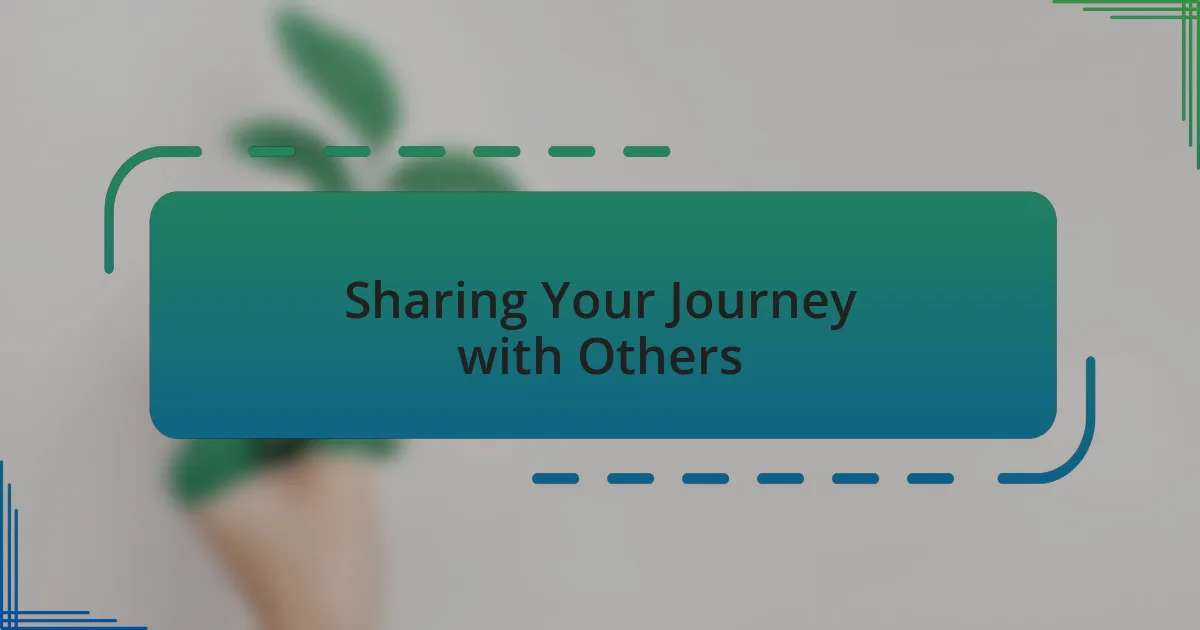
Sharing Your Journey with Others
Sharing your journey with others can be one of the most rewarding aspects of habit change. I vividly recall the day I gathered a small group of friends for a discussion about our individual sustainability goals. As we shared our victories and struggles, I felt a sense of community build that encouraged all of us to be bolder in our commitments. Have you ever experienced that moment when it feels like everyone’s rooting for you? It’s empowering.
When I joined local environmental groups, I discovered a wealth of shared experiences that deepened my understanding of climate action. Hearing diverse perspectives helped me realize that I wasn’t alone in facing challenges, and it motivated me to persist. Isn’t it fascinating how collective energy can amplify personal resolve? Each story exchanged was like fuel to my fire, sparking ideas and new approaches I hadn’t considered before.
I’ve also taken to social media to document my journey, sharing how small changes have made a difference in my life. I still remember the comment from someone who said my post inspired them to make a similar change. That moment was a powerful reminder of the ripple effect we can have on others. How often do we underestimate our influence? It’s incredible how sharing our experiences can inspire someone else to embark on their own transformative path.